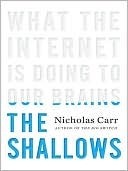More on this book
Community
Kindle Notes & Highlights
Read between
July 27 - August 3, 2021
“If we stop exercising our mental skills,” writes Doidge, “we do not just forget them: the brain map space for those skills is turned over to the skills we practice instead.”36
the public library was an oasis of bookish tranquility where people searched through shelves of neatly arranged volumes or sat in carrels and read quietly. Today’s library is very different. Internet access is rapidly becoming its most popular service.
The linearity of the printed book is shattered, along with the calm attentiveness it encourages in the reader.
The practice of deep reading that became popular in the wake of Gutenberg’s invention, in which “the quiet was part of the meaning, part of the mind,” will continue to fade, in all likelihood becoming the province of a small and dwindling elite.
Try reading a book while doing a crossword puzzle; that’s the intellectual environment of the Internet.
I realized the magic of the information age is that it allows us to know less. It provides us with external cognitive servants—silicon memory systems, collaborative online filters, consumer preference algorithms and networked knowledge.
The Web provides a convenient and compelling supplement to personal memory, but when we start using the Web as a substitute for personal memory, bypassing the inner processes of consolidation, we risk emptying our minds of their riches.
according to attention restoration theory, or ART, is that when people aren’t being bombarded by external stimuli, their brains can, in effect, relax.


